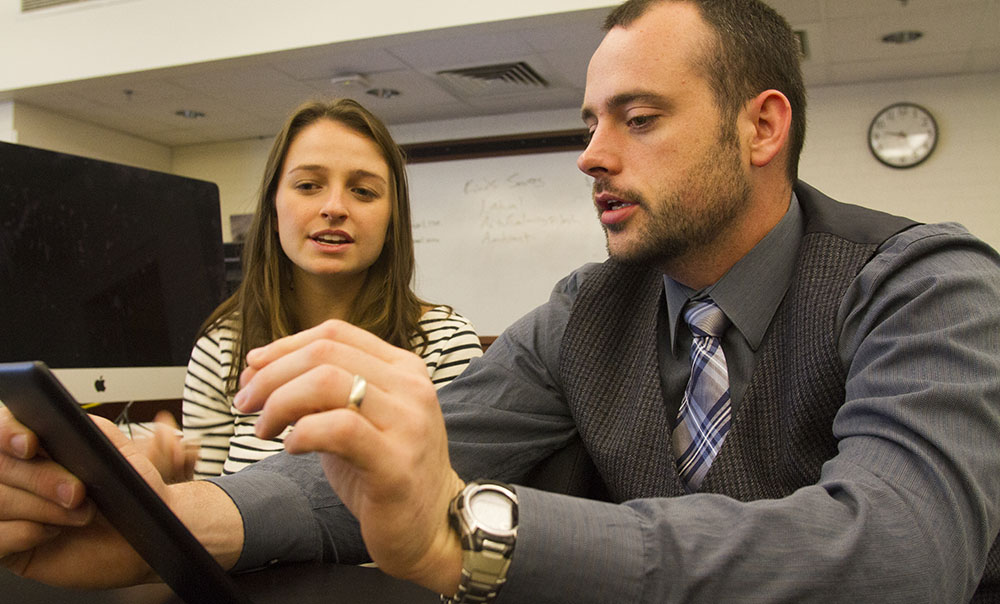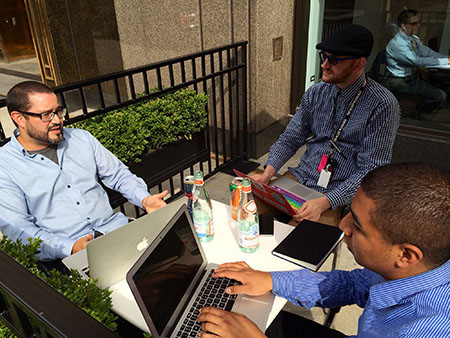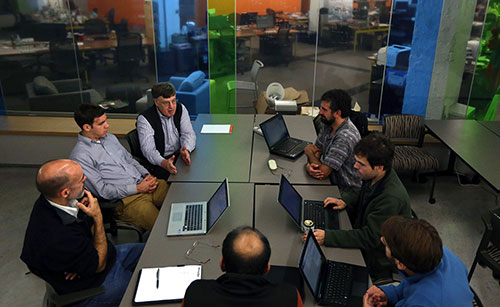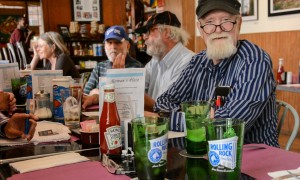
In the new multimedia world journalists inhabit, Fernando Diaz, the managing editor of Hoy, Chicago’s Spanish-language daily, is placing his bets on computer codes.
His last two hires were both developers: Nick Bennett, who has extensive experience in data mining, software development and Python (a programming language) and Lucio Villa, a computer developer who is also a photojournalist.
“Technology is a stronger bet than video for most news organizations because they will never be able to monetize their video enough to pay for the folks producing it,” said Diaz, who has been managing editor at the Tribune Media Group publication since 2010. “Technology investments, however, will scale, and the proof is obvious among the legacy leaders and the startups.”
Diaz is a champion for teaching journalism students how to be computer programmers. Yes, he knows it’s tough to learn. Yes, he knows that students themselves often have to be convinced of the merit. (He talked Villa into joining his development team instead of his multimedia team, telling him it would “scale his career faster and better.”)
Diaz also knows this: “Coding is the new grammar,” he said. “If students don’t know, at the very least, what web pages are and how they are built, they won’t last long in this game.”
But making the case to journalism educators has not been easy. Among educators and even news professionals, there appears to be no consensus about whether journalism schools should be teaching computer programming. Even those who believe it should be taught are not sure exactly how. The issue represents the great unsolved Rubik’s Cube in journalism education today, made all the more pressing by needs of news organizations like Hoy to have people fluent in journalism who also can develop news applications and tell interactive stories.

Fernando Diaz, left, managing editor of Hoy, meets with his development team Wednesday at a cafe in downtown Chicago. Photo by Jackie Spinner.
Lindsey Cook, a data reporter for U.S. News & World Report, would seem like an obvious advocate of teaching journalists to code. Cook curates the Data Mine blog for U.S. News and spends her days writing, coding, crunching numbers and designing graphics.
But Cook, who graduated from the University of Georgia in May with a double major in journalism and computer science, said her dream job isn’t what most journalism students aspire to do—and that presents significant challenges as journalism schools weigh whether and how to add computer programming to their curriculums.
“The camp of people who are saying every journalism student needs to code are misguided about what most journalism students do and where most journalism schools are,” Cook said. “At many schools, we’re still working on killing the divide between broadcast and writing so students can graduate with video and writing experience. Once you throw in social media, audio and some Excel, that’s quite a lot to start on.”
The topic almost certainly will come up this week as digital journalists and educators gather in Chicago for the annual conference of the Online News Association. A session on learning basic programming language advertises: “You’ve heard the mantra: journalists should know how to code.” Then it sets out to do just that, providing an overview of programming in a one-hour crash course.
Many top journalism schools have been steadily expanding their offerings in computer programming. Some are launching new interactive media majors that mash journalism and computer science skills, and their graduates are much in demand.
At the University of North Carolina at Chapel Hill, undergraduate journalism students can concentrate in a revamped developer specialization that is heavy on data, design and coding. The first class of nine students in the school’s redesigned Interactive Media program graduated in May 2013—and they all emerged with either a job or an internship, according to the program’s coordinator, Steven King, a former editor and director of video for the Washington Post.
“They were all very sought after. There was a bidding war,” he said. “We are putting people out there that the industry needs. The bad part is that only big places that can hire them. The big media companies, CNN, NYT, they’re all doing really good stuff. The top 5 percent are doing it. Hopefully that’s going to catch up.”
The UNC School of Journalism and Mass Communication has more than 800 students, so its first group of journalist-developer graduates was a small number, but King said it’s been a success. This month, the Wall Street Journal hired three of UNC’s May graduates to work in the newsroom developing news and data-driven web applications and graphics.
Eric Newton, longtime executive at the Knight Foundation, applauded new programs like UNC’s, saying they are taking chances, developing programs ahead of demand, offering them because there will be demand. This is a way for journalism education to lead in digital innovation, he said, instead of assuming its usual position as the “caboose” while news organizations drive change.
“Experimentation in journalism education needs to happen even if 999 out of 1,000 things don’t work the first time,” Newton said.
What Do Journalists Need to Know?
One difficulty in trying to teach coding to journalism majors is that many students still define the profession and their career goals through traditional roles—just as many schools themselves remain structured around old media platforms. Most students want to be writers, broadcast correspondents or photographers.
Only a few students see career opportunities in news application development unless it is pointed out to them. Some schools introduce new career paths in interactive design and apps development early on, in introductory journalism courses, to make students aware that these jobs exist. But there is no universal acceptance in journalism education of the idea that all journalists need to code.
In an article for the Atlantic last year, written just after the annual ONA conference,staff writer Olga Khazan argued that journalism schools should not waste their time teaching students how to code because most aspiring journalists don’t want to work in web design or development.
The article touched off a lively public debate among journalism professors and people working in the news industry, including some who feel strongly that basic web coding is an important 21st century skill essential for anyone working in the media industry.
Joshua Benton, director of Harvard’s Nieman Journalism Lab, fired off a tweet noting that people once said similar dismissive things “about word processors, spreadsheets, social media, and video editing.” He stressed the importance of HTML, the simple markup language that creates web pages.
(Mindy McAdams, a professor at the University of Florida specializing in digital journalism, captured the discussion here.)
But the debate persists, and it is further complicated by confusion over the language used to describe programming related to journalism. Not everyone means the same thing when they talk about teaching code.
Do we call a class that teaches HTML (used to define web page structures) and CSS (used to design web pages) “coding” when we know that both are markup languages and not technically “programming” languages? Programming languages give more complicated instructions to computers, typically including logic and functions, and are used to create software programs and apps that do more than display web pages.
Most top journalism programs teach basic web development, focusing on HTML and CSS. Some even require students to learn HTML, though there is no widespread agreement that it should be required knowledge for students.
Some programs go deeper, teaching low-level programming languages such as Javascript and jQuery, or introducing students to Python, a more advanced language used to build and run applications and software. Students who acquire these skills, either because they take classes in journalism school or complete self-guided tutorials through Codeacademy, certainly benefit, at the very least, through expanded career options.
Expanding Into Programming
While more journalism schools teach web markup than teach programming, a growing number are pushing more deeply into programming through the introduction of courses, specializations, majors and partnerships with computer science departments.
Some, like UNC, have launched new interactive media majors that mash journalism and computer science skills. And next year, UNC will offer a joint major between Computer Science and Journalism. The other major will be called Interactive Media User Experience.
“Both majors will emphasize the importance of storytelling and understanding data, but the joint major will focus on a deeper level of programming and computer concepts that is heavy in database,” King said. “The Interactive Media User Experience major will be rooted in news and interaction design, data visualization and front-end programming.”
Creighton University, a private university in Omaha, Nebraska, merged its journalism and computer science programs in the fall of 2013 to create a new Department of Journalism, Media and Computing. Columbia University’s Graduate School of Journalism offers a combined journalism and computer science program.
“A number of j-schools do have some kind of coding class now,” said McAdams, the Florida professor who has taught code and programming skills. “For many, however, it’s only HTML and CSS. Very few, if any–have a required course in which students learn the principles of programming. I’ve seen that a lot of classes that include JavaScript, which is a programming language, merely ask students to use existing plug-ins, which often require no programming at all.”
King summed up the skills of his students like this: “They can write a little bit. They can report for sure. They know and understand data. Can design and develop. It’s a range of working with computers to do data analysis, new applications, new media properties.”
Matt Waite, professor of practice at the University of Nebraska, said his school, like a lot of journalism programs, is dabbling but not embracing coding or web development. “It is not a permanent part of the journalism curriculum and other faculty do not teach it,” he said. “The one HTML class we did have in the curriculum was made optional last year by the journalism faculty. So in any semi-permanent way, programming/code/HTML is not part of our curriculum. I offer classes in news applications, story bots and data visualization as special topics classes, so students have an opportunity to get that while they are here, but they are all electives in a sea of electives.”
Waite, the principal developer of the Pulitzer Prize-winning PolitiFact, said he goes back and forth about the right approach for teaching web and development skills to journalism students. “Is it tweaking the existing classes to emphasize certain things and de-emphasize others, like adding something to a basic reporting class that emphasizes web publishing or multimedia?” he said. “Is it more radical than that, say eliminating certain courses and creating new ones? Is it creating a whole new major — publishing — that has some journalism, some advertising, some business, some computer science? Do we need to chuck some of the old liberal arts emphasis for more business and math? I’m just not sure. The answer might be yes, all those things. We need to tweak some classes, kill others, revamp the outside-the-building requirements, create a new major. I’m just not sure which way is the right way.”
His goal is to create journalists who can understand and write some code, Waite said. “I want them to treat that as a super power in whatever they choose to do,” he said. “If they want to be a reporter, I hope they learn in my classes how to use their computer to do their jobs better, by creating scripts that fetch data or visualize some data to help them identify trends or questions. If they want to do more programming, I want my students to learn how to marry their programming skills with their journalism skills to create new platforms and experiences for stories.”
“It’s Easier to Teach Programmers Journalism”
Most newsrooms are still hiring computer programmers and teaching them journalism. Greg Linch, a project editor for The Washington Post, said his thinking on this has evolved. His perspective certainly reflects the approach of Northwestern University, which entices computer programmers through scholarships from the Knight Foundation.
“I used to believe it was better to teach journalists to program, but in the last couple of years I’ve realized it’s easier to teach programmers journalism,” Linch said. “It’s easier to teach journalism skills to people who know already the programming. Everybody I’ve met who uses code as their primary tool in the newsroom has fantastic critical thinking skills and asks a lot of really good questions. We’ve gotten past this where we don’t see coders as program monkeys.”
Dan Sinker, who heads up the Knight-Mozilla OpenNews project for Mozilla, said the number of programmers working in journalism that came from journalism, teaching themselves along the way, is pretty small.
“I can think of maybe five,” he said. “Most of them came from other fields, already very familiar with programming but wanted to do work with real meaning. As much as doing great journalism is hard, doing great programming is a lot harder in terms of time to learn it. It’s faster to teach good programmers journalism than it is to teach good journalists programming. It just is.”
Sinker said teaching students how to code is hard because coding is hard. “It’s a real slog,” he said. “But most people start down that path when they have things they care about getting done. So that’d be job one: How do you construct these classes so that students have skin in the game and aren’t just following tutorials and instructions? Nobody learns to program effectively that way. Programming is about problem solving–it helps a lot when you are the one having the problems.”
Andy Boyle, a former news applications developer for the Chicago Tribune who starts a new job next week as web developer for BreakingNews.com, a part of NBC News Digital Group, said one way to sell computer programming to students is to make sure all of the lessons and class projects apply to news. That can’t happen if journalism students simply take existing computer science courses or if those computer science courses aren’t modified to a news environment, he said.
And Boyle, like Cook at U.S. News, said he knows all journalism students don’t need to know how to code. But, he added, “all journalists need to learn the basics of data.”
Big Data and Programming: Not the Same
Many journalism schools recognize that data is key to the programming world, and it’s reflected in the growing emphasis on data in journalism education. Big data. Little data. Students need to be able to work with numbers and understand data.
“Numeracy is the big thing,” said Newton of the Knight Foundation. “What numeracy is to me is that we can longer get away with having an 8th grade level. Having to teach journalists how to do percentages when they are college graduates is just not acceptable in a big data world. ‘’
But knowing data is not the same as knowing how to code. Just as multimedia is different from social media, data journalists are not necessarily developers or programmers. Still, the two are related, as programming is often required to manipulate and interpret data.
Open hack and hacker nights have helped interest students (and citizens) in the possibility of data by bringing together programmers and people interested in technology with journalists and entrepreneurs.

A group discusses coding on Sept. 23 during Open Gov Hack Night, a weekly meeting in Chicago where developers, designers, and data scientists work on civic tech projects. Clockwise, from lower left: Denis Roarty, Jeremy Andereck, David Melton, Ben Galewsky, Nick Bailey, Scott Shander, and Amitabh Chaudhary. Photo by Alex Wroblewski.
“Obviously big data is integral to the informational environment that reporters inhabit and negotiate with, and they must be acutely aware of the kinds of journalistically valid questions they can approach data sets to answer,” said Ed Wasserman, dean of the Graduate School of Journalism at the University of California at Berkeley. “Plus they should have a solid understanding of just how those questions must be framed and posed. Many will want to be able to do that coding themselves, and we teach those who do. The tricky part is balancing training in those skills against training in other skills that enable journalists to interrogate equally valid, albeit traditional data sources–reading 10Ks, searching court files, interviewing poor people. We need them to do it all, don’t we?”
Not All Journalists Need to Code
In many ways, it has been easier to add multimedia and social media to journalism school curriculum. Many students are already on Facebook, Twitter and Instagram. And while every journalism program has a few students who begrudgingly learn multimedia, for the most part, students find learning photography and video to be fun.
In most newsrooms, it’s understood at this point that entry-level hires, especially ones right out of journalism school, can use Twitter professionally, are comfortable with shooting video and can provide audio of a press conference if asked.
Kristi Angel, who is the managing editor for the Billings Gazette, said the last entry-level reporters the Montana newspaper hired had to know how to file remotely with a hot spot and and how to use an iPhone.
“We value technology skills,” she said. “It’s important to be able to do reporting on many platforms.”
But she has no expectation that new reporters will know how to code.
“We have programmers that do that kind of work on our website and on our apps,” she said. “In my view, it’s more expensive to hire a programmer than it is to hire a reporter, and those are totally different skill sets. If you have a reporter who can do programming, why would they want to take a reporting job when they can make bank right out of school by programming? The people who know that kind of coding build ads for our site, too. Our front-end system is set up so that reporters and editors never even peek into the bowels of the website.”
Danylo Berko, a senior developer for Bon Appétit, who graduated with a journalism degree from Northwestern in 1997, said this is exactly why journalism schools should not race to develop the Super Graduate with Programming Skills (not to be confused with the Super Journalist who can write breaking news and longform narratives, take award-winning photos and produce first-rate video.)
“I don’t think there’s great value in teaching programming to everyone unless they want to learn it,” said Berko, who has worked as a night producer, reporter, writer, editor and developer after nearly two decades in the field.
Though he’s an advocate for teaching journalism students how to navigate a content management system, everything else is “basically a crapshoot,” he said. Journalism schools, like industry, can get overly caught up in trends, new platforms, what’s here today. But what matters is what always has mattered, Berko said.
“Video has been ‘the answer’ for close to a decade now, and I don’t know that anyone has made an empirical case for it outside of native video producers,” he said. “It still comes down to news sense, telling a story, asking questions, not accepting no, understanding how to report and disseminate information as well as the technical aspects: editing and watching levels.”
Jackie Spinner (jackiespinner@mac.com) was a staff writer for the Washington Post for 14 years and covered the wars in Iraq and Afghanistan for the paper. She is the author of “Tell Them I Didn’t Cry: A Young Journalist’s Story of Joy, Loss, and Survival in Iraq.” Spinner is now an assistant professor of journalism at Columbia College Chicago and teaches social media and digital storytelling.








Leave a Comment